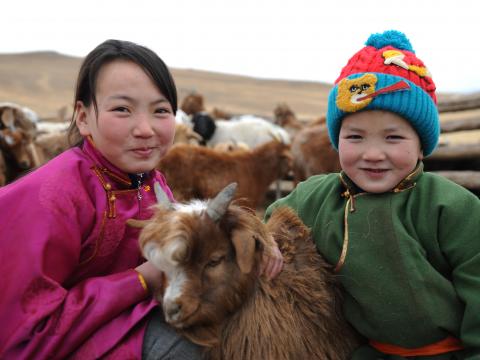Modern nomads

Mongolia’s vast steppe is home to some of the world’s last nomads, with the herders’ centuries-old tradition being their main source of income. Seeking better economic conditions, education and modern conveniences, however, many are abandoning the plain for the city, while the remaining few face the relentlessly harsh weather.
Wedged between two hills is a small ‘ger’, Mongolia’s classic shelter, which is the winter home for Purevdorj and his family. As nomads, they move several times a year in search of the best location: somewhere near a river in summer; a cranny shielded from the bitter wind in winter.
Loving his way of life and proud to follow his ancestors’ traditions, Purevdorj lives with his wife, Sodgerel, and their two children: 13-year-old Ganchimeg and nine-year-old Gantulga. Their father is especially devoted to his 10 horses and has won many titles after training the animals to race from a young age.
Although they have the same number of cows as horses, the household’s primary source of income is the wool sheared from their 150 goats and sheep. Last year, Purevdorj sold 10kg of cashmere wool taken from his goats, which is a massive jump from just two years ago.
“I only got 2-3kg of wool from my goats before,” the 39-year-old says.
A herder’s livestock count and the animals’ survival, which is highly dependent on the weather, are crucial for sustainable income, with Purevdorj’s family slipping below the poverty line when they only had 60 goats.
Remembering their struggle, Sodgerel says, “We only had enough money for rice and flour then.”
To boost their income, World Vision gave the family 90 mature animals, as well as their offspring, which a year later had doubled the herd’s number.
Ganchimeg says, “I help my parents look after the sheep and to milk the cows. I also feed the kids and lambs sometimes. The lambs are so cute! And it feels good to have enough animals.”
As the number of their livestock has increased, so has their income, enabling the family to meet their children’s basic needs, including a safe home environment, school supplies and food.
The girl’s mother adds, “We’ve bought a solar panel, so now we have electricity at home. We used to use candles at night. We’ve also bought a TV, so we can watch the weather forecast, which means we know when a snowstorm is coming. At those times, we can make sure our animals are safe and not go outside ourselves."
“Our income has increased a lot, so life is much better. Now we can spend more on our kids’ education and things for school.”
Supporting vulnerable herding families is part of World Vision’s economic development work in Mongolia, which aims to improve and diversify income sources and thereby ensure food security.
With a more secure home environment for her health and education, Ganchimeg has big plans for her future. She says: “My favourite subjects are biology and chemistry because I want to be a doctor.”